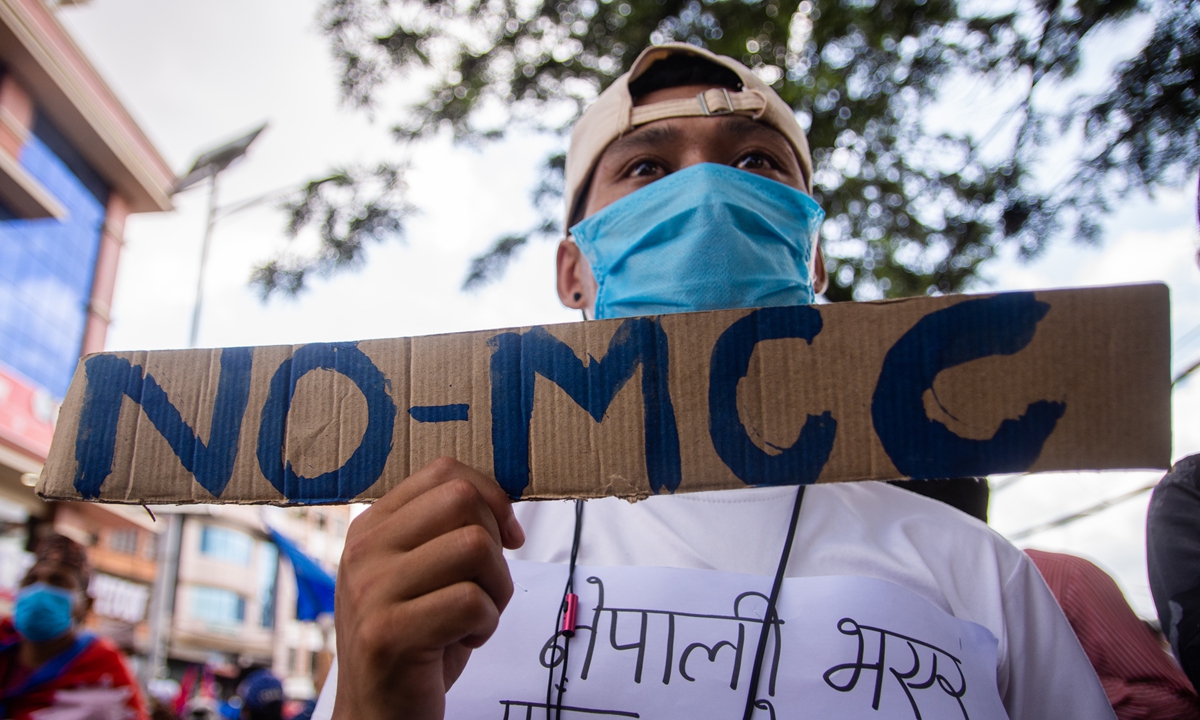IN-DEPTH / IN-DEPTH
US’ MCC grant most divisive issue In Nepal

A Nepalese youth holds a cardboard sign during a protest against Millennium Challenge Corporation (MCC) programs in Kathmandu, Nepal, on June 27. Photo: AFP
The $500 million US Millennium Challenge Corporation (MCC) grant has morphed into a contested geopolitical issue in Nepal, dividing its populace for and against it. Those supporting it argue that the US grant helps build much-needed power transmission lines and upgrades dilapidated roads, but a growing number of people have insisted that it has undermined the country's sovereignty and constitutional autonomy.
The evolving narrative is that MCC Nepal Compact is a part of the US-led Indo-Pacific Strategy (IPS) that aims to contain the rise of China. If Nepal accepts MCC funds, it risks alienating its northern neighbor, say the critics from diverse backgrounds.
With the political leadership still divided on its content, US State Department officials have piled on pressure for its parliamentary ratification at the earliest possible date. A flurry of visits of US officials to Nepal indicates growing impatience with Nepal's government over the delay in its ratification.
In his recent meeting with a host of Nepali leaders, US Assistant Secretary of State Donald Lu warned that the US would divert the grant amount to other countries if Nepal failed to approve MCC Nepal Compact from the federal parliament. In 2017, Nepal and the US inked the MCC grant agreement that was registered in the parliament in 2019. US Assistant Secretary Lu even asked CPN-Maoist Centre chairman Pushpa Kamal Dahal Prachanda to decide whether or not to accept the MCC grant by mid-December, putting his party in a tight spot.
Divided political parties
Kathmandu and other cities of Nepal have witnessed protest rallies against the MCC deal on an almost daily basis. The five-party ruling alliance has been sharply divided on its approval from the legislature. The Nepali Congress that leads the government and its junior partner - the Janata Samajbadi Party - want to endorse it but other allies - CPN-Maoist Centre, CPN- Unified Socialist, and the National People's Front Nepal - are not ready to accept it in its current form. They have sought to amend a number of objectionable provisions of the agreement.
The main opposition - CPN-UML - that commands the largest number of seats in the federal parliament has taken an "opportunistic" stance on the MCC grant. UML chair and former prime minister KP Sharma Oli was hell-bent on getting it endorsed while in power. But now, changing his tune, Oli says his party will form its view on MCC only after the ruling parties come up with their position on it.
Understandably, the US is worried about whether Nepal will follow the footsteps of Sri Lanka that refused to sign a $480 million MCC agreement in February 2020, citing that some of its features "threaten national security and [the] welfare of the island nation." If Nepal rejects the MCC grant, this will surely give a negative message about the waning superpower to the world.
Lu suggested that Nepali leadership follow a "democratic and consultative approach" to gain consensus for the grant but his government has turned down the request of Nepal's political parties to renegotiate the terms and conditions of the agreement. On the eve of the visit of MCC vice president Fatema Sumar to Nepal in September, her office had clarified the concerns raised by Nepal's Ministry of Finance but rejected the possibility of amending the controversial clauses. No matter how credible its clarification points are, they do not acquire legal status.
The clauses related to operational law, intellectual property rights, procurement, payment of tax, liability or loss of its property, and auditing and suspension of the project, among others, have caused controversies. The MCC office has stated that MCC Nepal Compact is not above Nepal's constitution, but Compact provisions contradict this claim.
The Section 7.1 of the Compact reads, "The Parties understand that this Compact, upon entry into force, will prevail over the domestic laws of Nepal." At the same time, the Compact has been described as an international agreement that will be governed by the principles of international law. (Section 6.4) In such a case, how can Nepal's constitution prevail over it? Nepal contributes $130 million to the MCC project but "all the intellectual property under the programme belongs to the only rightful owner MCC, acting on behalf of the United States Government."
The MCC headquarters insists that its grant is not part of an Indo-Pacific Strategy but other US policy documents claim MCC as an integral part of the IPS and its national security strategy. A US State Department document titled "A Free and Open Indo-Pacific: Advancing a Shared Vision" recognized the MCC and the Overseas Private Investment Corporation (OPIC) as economic pillars of the IPS.
Suspicion
In December 2017, the US issued the National Security Strategy (NSS), which argues that the MCC will be used for executing diplomacy and assistance abroad. It clearly targets China, stating that the latter's dominance risks "diminishing sovereignty" of many states in the Indo-Pacific region, calling for sustained US leadership. The NSS pulls no punches: "US development assistance must support America's national interests." By "national interest" the US means to exercise its hegemony in the Indo-Pacific region through its development assistance. The NSS gives credence to widespread suspicion that the MCC is to serve as a diplomatic instrument to advance the US' geopolitical ambition in the region.
There are basically two documents related to the MCC Nepal Compact - the Millennium Challenge Compact signed on September 14, 2017 in Washington DC and Program Implementation Agreement (execution version) signed on September 29, 2019 in Kathmandu. But no document mentions about approving the agreements from the parliament. One motive behind the US' insistence on their parliamentary ratification is to get the upper hand in legal questions pertaining to the implementation of MCC project.
The author is the Deputy Executive Editor of The Rising Nepal

